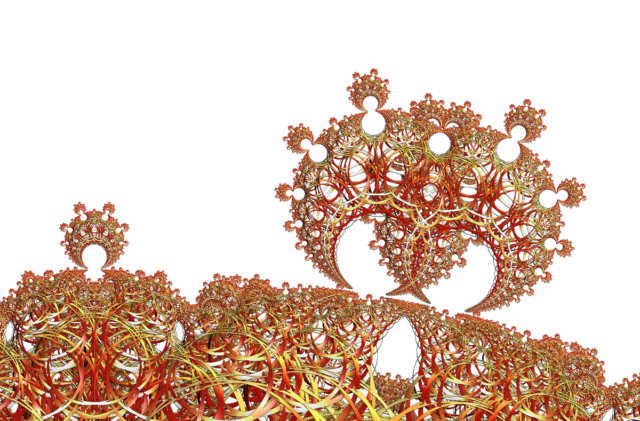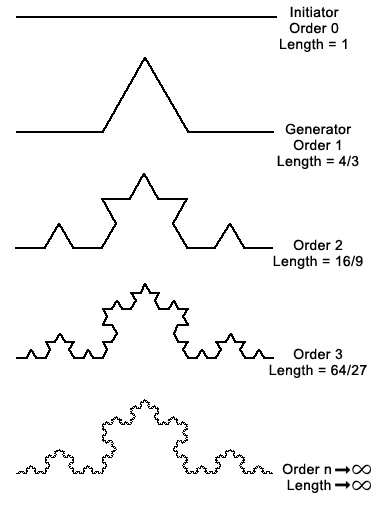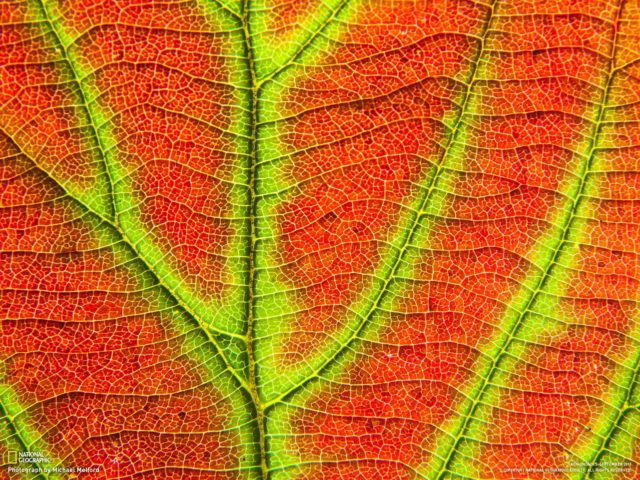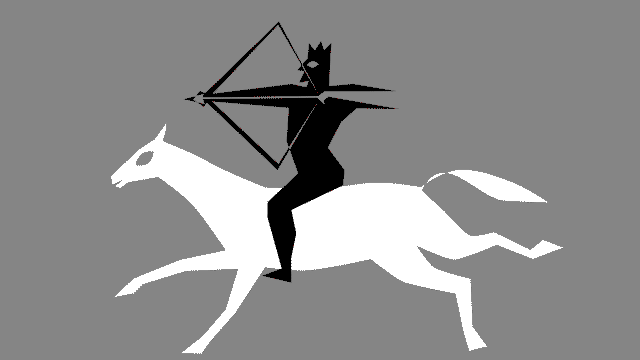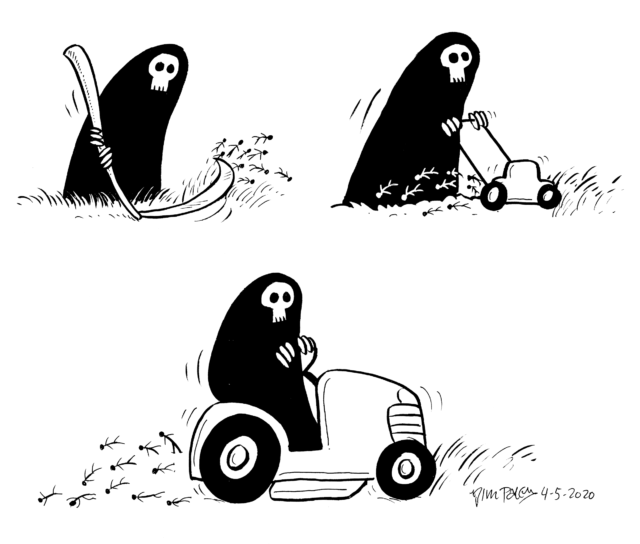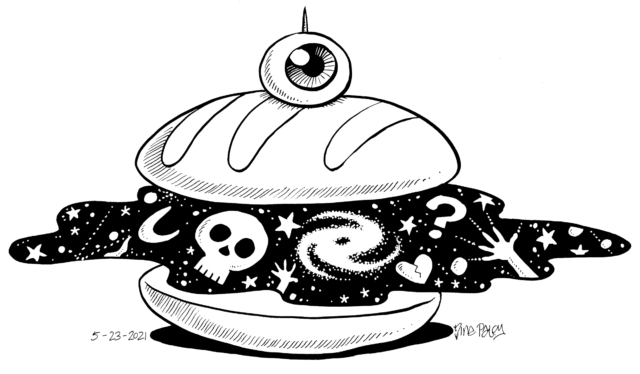
Category: philosophy
Heterodorx
Hey TERFs and Trannies! That’s my signature greeting on Heterodorx, the new podcast I’m doing with Corinna Cohn. Our first episode was recorded Friday evening, after I’d biked 30 miles and hiked two, so I wasn’t at my most articulate. We had some technical issues, including my cat, Lola, rubbing her head against my mic, causing loud horrible noises we couldn’t remove due to recording everything on a single track. Our next episode should be better. Still, I like this first foray, and hope you listen.
Heterodorx podcast
Heterodorx web site
Collective Senescence
When I learn a new song – something I do unconsciously, every time I am exposed to new music – is some other song erased in my memory to make room? No. I seem to have unlimited capacity for memorizing music, even as my memory is like a sieve elsewhere. How does my brain do that? Does it re-use existing pathways, or create ever-more byzantine new ones? I imagine my mind’s architecture as ever-expanding fractals, filling the same space with more and more curves and crevices.
The older I get, the more byzantine my mind’s labyrinth, all to store the unceasing stream of new information. Now, when I forget the name of something, I imagine the word stuck in a crevice of the fractal. When I was younger and my pathways less intricate, there weren’t enough curves and bends for words to get caught. Now they snag on every corner.
What is information? In my life, it includes experiences. Every day is different; every day impresses new memories. Do the old ones disappear? Certainly my memories are difficult to access, especially names. But I know they’re in there somewhere. I’ve had deeply stored knowledge return to consciousness when revisiting geographical places, homes I’d been in before but never thought about since. If you asked me to recall my friend’s house in San Francisco between visits, I’d have come up blank; but revisiting, I knew where everything was. I took delight in long-buried memories flooding my consciousness as I rode a bus from the airport to the Presidio two years ago. Sometimes that visit felt like walking through my own dreams, geography and symbols shaped by my lifetime of accumulated experience.
Then there is the information of stories, words, music, numbers, images: Culture. Culture is collective, a living thing like a tree or forest that grows in the soil of human minds. Cultural information is experienced through exposure – reading, listening, tasting – and stored in everyone who experiences it.
How many songs will I store in my lifetime? How to even count? Some of them are surely buried too deeply in my mind to recall at will, but they are still there. All that information embedded in our minds’ labyrinths, that we are not aware of, is what Jung called the Collective Subconscious. Like the webs of biological life on this planet, they are too vast and complex for us to comprehend. We are only aware of a tiny bit at a time.
As I age, I find comfort in routine. Every day resembling the next makes memory storage easier. A curve of the fractal is already structured to store much of the day, with only a few details to be slotted elsewhere. Too much information at once can be traumatic. Moving house is traumatic for me, having to learn a new space. Moving to a new region is more so: having to make new friends, locate new food sources, learn new roads. Moving to a new country is more traumatic still, with new regulations, currencies, bureaucracies, and, most daunting of all for an older person, new language. All of these require new memory structures, new tunnels excavated in the catacombs. A young mind, like an “uncarved block,” takes this on with relative ease. An old mind has already been carved to delicate tracery, every branch with more branches, like the fragile intricate lace of an autumn leaf. Carve more into that, and you’ll tear a hole.
Even without trauma, the mere accumulation of experience over time leads, inevitably, to structural collapse. From the outside, this may look like senility. I increasingly believe that senility is an inevitable phase of consciousness. Live long enough, you will develop dementia. At least that’s how it looks from the outside; I don’t know what dementia is like from the inside, although I’ve read some reports from writers in its early stages. Surely some of the “blocks” our experience carves are more robust than others; a crumblier material may suffer early-onset dementia, while the most solid will die of other causes before their veins of memory fractals become too fine to sustain.
But what of our collective mind? We store information collectively too, as Culture. An ever-expanding human population is one way to increase storage capacity. But consider that many of us are storing the same things: the same languages (the number of living languages is decreasing even as the population increases), same songs, same movies, same stories. This is due to media. Literacy/writing was a great early cultural storage invention, allowing far greater numbers to be exposed to the same information. The printing press increased this exposure exponentially. Then phonographs, movies, radio, and television, leading up to, of course, the Internet, the greatest information-exposure system ever created.
Many of us, like me, spend hours a day “scrolling” information online. The density of words, pictures, and sounds is…well, it’s insane. Individually, I am storing this stuff; it’s shaping my neural pathways in ways I don’t know. I may not know exactly what it’s doing, but I know it’s doing something, accelerating the rate of tunneling of my memory labyrinth, increasing the complexity of my mental fractal. If I am wasting my attention on social media, it is because there is a cost: every stupid piece of (mis)information, adds that much complexity to my neural pathways, that much fragility to the overall structure, and brings me that much closer to senility.
Likewise, collectively, we have massively increased our exposure to information. Our collective memory structure, whatever it is, is collectively growing ever-more complex.
Collectively, we are becoming senile.
Complexity is fun (beneficial, desirable) for a while, but eventually and inevitably it leads to collapse. I’m not against complexity; it’s inevitable. Culture is a life form, and all life forms die. There is no way to stop this. Death is a consequence of life; dementia is a consequence of consciousness.
Witnessing a Miracle
The COVID-19 pandemic is a miracle.
I mean this in the biblical sense. Biblical miracles are horrific, bringing death and destruction. The Ten Plagues of Exodus were miracles, or at least “wonders.” The miracles of Revelation are even worse.
A miracle isn’t a fluffybunny event. It is an act of God.
The COVID pandemic is a power greater than ourselves. We can’t stop it; we understand very little about it. It brings us to our knees.
I am in awe of it. I have watched humanity killing the planet my whole life, with obvious warnings of dire consequences. But this Spring’s COVID shutdowns were the first time I saw humanity do anything about it. It was short-lived, but amazing: flights grounded, industry slowed, pollution abated enough to reveal long-hidden mountains for the first time in years.
All of that ended after only a few months. Nothing to see here, folks; go back to paying attention to MONEY. And so contrails again fill the skies, mountains retreat back into smoggy shrouds, and the gears of commerce grind away.
Biblical miracles are famously unheeded, which is why it took all Ten Plagues for Pharaoh to relent. God issues clear commandments; humans don’t follow them. This is the whole story of the Old Testament. Even after occupying the Promised Land, the Hebrews can’t get their shit together, and Jerusalem falls over and over again. The New Testament is no better, especially the ending.
The COVID-19 virus makes its demands pretty clear: Avoid crowds. Stop industrial slaughterhouses and factory farming. Don’t go to (non-essential) work. Spend time with your children; actually raise them. Stay home from school. Stay home, but go outside; look at the sky, feel the sun, breathe the fresh air. Attend to Reality over money. Don’t go to bars, don’t party, don’t crowd into spectacles like sportsball. Calm the fuck down. Take a goddamn break from your hyper-consumer lifestyle.
We still need food and shelter and medicine, the sustenance and maintenance of our lives, and the virus doesn’t seem to have anything against these. The virus clarifies what is essential and non-essential. It turns out much of human activity isn’t essential. We already knew that; the virus urges us to stop denying it.
The pandemic makes another biblical suggestion: a Jubilee cancellation of debt. We can’t stop the gears of commerce, we argue, because we’re all in debt – if we don’t earn money, we will die! Our society won’t forgive debts, but what if we simply froze them, until a vaccine or cure is found? A year (or however long it takes) out of commercial time. Don’t end, but suspend the non-essential economy. All debts, for everyone, everywhere, frozen*. A global time-out. That would be a miracle.
I don’t believe in the biblical god. But I do believe in Nature, and natural consequences. The coronavirus is just one of many disastrous and inevitable natural consequences of human activity. Animal agriculture and overpopulation and global industrialization will do this; it’s a wonder it’s taken so long. It’s also a wonder how gentle the virus is, all things considered. It could have been more like ebola, with a much higher death rate. Plagues of the past have been far deadlier. The Black Death killed 50% of some European regions. We are getting off lightly here.
My response to this miracle is awe. Others respond with denial, or panic, or exploitation. So it has been written; so it ever was, and ever will be. I have long felt like I’m living in a dystopian novel, but right now I also feel like I’m living in a biblical prophecy. What a wonder, to witness these times!
*What about money to run the essential services? Our economic system accumulates vast reservoirs of money in billionaires. If these reservoirs can’t be used, then what exactly is this system for?
Progress/Innovation
Paroles, Paroles (Words, Words)
Paroles Paroles from Nina Paley on Vimeo.
Directed, animated, designed, etc. by Nina Paley
Hebrew consultant: Aharon Varady
Subtitles to come once I figure out how to make them Subtitles on everything except the repeating end verses, because I manually typed my first ever SRT file at 5am
Song: Paroles, Paroles
Score: Gianni Ferrio
Lyrics: Leo Chiosso and Giancarlo Del Re
Vocals: Dalida (Goddess) & Alain Delon (God)
circa 1973
(song abridged by Nina Paley)
English translation:
Male/God: IT’S STRANGE
I DON’T KNOW WHAT IT WILL BE LIKE FOR ME TONIGHT
I LOOK AT YOU AS I DID THE FIRST TIME
Female/Goddess: MORE WORDS, ALWAYS WORDS
THE SAME WORDS
M: I DON’T KNOW HOW ELSE TO TELL YOU
F: JUST WORDS
M: BUT YOU ARE THAT BEAUTIFUL LOVE STORY
THAT I WILL NEVER STOP READING.
F: EASY WORDS, FRAGILE WORDS
AREN’T THEY PRETTY
M: YOU ARE THE ONE OF TODAY AND THE ONE OF TOMORROW
F: TOO PRETTY
M: YOU ARE ALWAYS MY ONLY TRUTH.
F: BUT THE TIME FOR DREAMING IS UP
MEMORIES ALSO FADE
WHEN WE FORGET THEM
M: YOU ARE THE WIND THAT MAKES VIOLINS SING
AND YOU CARRY THE PERFUME OF ROSES
F: TOFFEES, SWEETS AND CHOCOLATES
M: SOMETIMES, I DON’T UNDERSTAND YOU.
F: THANKS, NOT FOR ME
GIVE THEM TO SOMEONE ELSE
WHO LIKES THE WIND AND THE ROSES’ PERFUME
TENDER, SUGAR-COATED WORDS
TASTE SWEET ON THE LIPS, BUT NEVER IN MY HEART
M: ANOTHER WORD.
F: WORDS, WORDS, WORDS
M: LISTEN TO ME!
F: WORDS, WORDS, WORDS
M: PLEASE.
F: WORDS, WORDS, WORDS
M: I SWEAR TO YOU.
F: WORDS, WORDS, WORDS, WORDS, WORDS
MORE WORDS THAT YOU SOW IN THE WIND
F: WORDS, WORDS, WORDS
M: LISTEN TO ME.
F: WORDS, WORDS, WORDS
M: PLEASE.
F: WORDS, WORDS, WORDS
M: I SWEAR TO YOU.
F: WORDS, WORDS, WORDS, WORDS, WORDS
MORE WORDS THAT YOU SOW IN THE WIND
M: YOU ARE SO BEAUTIFUL
F: WORDS, WORDS, WORDS
M: YOU ARE SO BEAUTIFUL
F: WORDS, WORDS, WORDS
M: YOU ARE SO BEAUTIFUL
F: WORDS, WORDS, WORDS
M: YOU ARE SO BEAUTIFUL
F: WORDS, WORDS, WORDS, WORDS, WORDS
MORE WORDS THAT YOU SOW IN THE WIND
________
Original French lyrics (translated from Italian by Michaële, abridged by Nina Paley):
C’est étrange,
Je ne sais pas ce qui m’arrive ce soir,
Je te regarde comme pour la première fois.
Encore des mots toujours des mots
Les mêmes mots
Je ne sais plus comme te dire,
Rien que des mots
Mais tu es cette belle histoire d’amour…
Que je ne cesserai jamais de lire.
Des mots faciles des mots fragiles
C’était trop beau
Tu es d’hier et de demain
Bien trop beau
De toujours ma seule vérité.
Mais c’est fini le temps des rêves
Les souvenirs se fanent aussi
Quand on les oublie
Tu es comme le vent qui fait chanter les violons
Et emporte au loin le parfum des roses.
Caramels, bonbons et chocolats
Par moments, je ne te comprends pas.
Merci, pas pour moi
Mais tu peux bien les offrir à une autre
Qui aime le vent et le parfum des roses
Moi, les mots tendres enrobés de douceur
Se posent sur ma bouche mais jamais sur mon coeur
Une parole encore.
Paroles, paroles, paroles
Écoute-moi.
Paroles, paroles, paroles
Je t’en prie.
Paroles, paroles, paroles
Je te jure.
Paroles, paroles, paroles, paroles, paroles
Encore des paroles que tu sèmes au vent
Paroles, paroles, paroles
Écoute-moi.
Paroles, paroles, paroles
Je t’en prie.
Paroles, paroles, paroles
Je te jure.
Paroles, paroles, paroles, paroles, paroles
Encore des paroles que tu sèmes au vent
Que tu es belle!
Paroles, paroles, paroles
Que tu est belle!
Paroles, paroles, paroles
Que tu est belle!
Paroles, paroles, paroles
Que tu est belle!
Paroles, paroles, paroles, paroles, paroles
Encore des paroles que tu sèmes au vent

